Shogun: Total War
Stunning 3D strategy game reviewed.
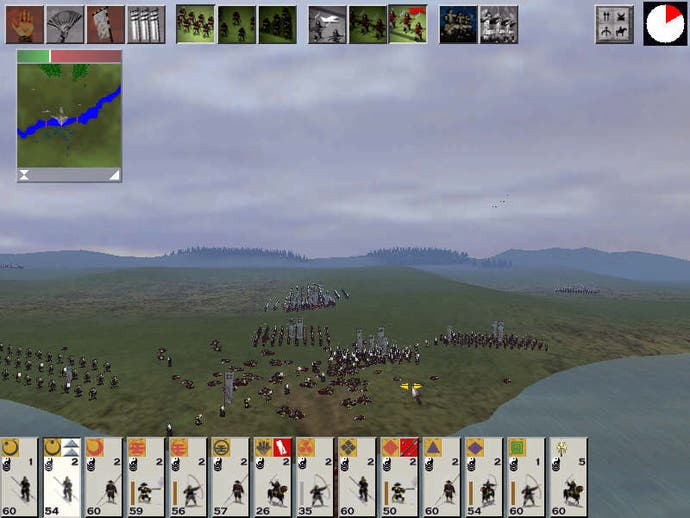
All About Size
Real time strategy has been a staple of the PC gaming diet ever since Command & Conquer appeared on our screens all those years ago and, along with the first person shooter, it has been one of the genres that have defined PC gaming.
However, as is also the case with the first person shooter, strategy games now face a battle of innovation, as fresh new ideas take precedence over pretty graphics and powerful units. Witness the relatively poor reception that Westwood's Tiberian Sun received - proof, if any was needed, that the traditional 2D RTS must evolve if it is to survive.
It's in this sort of environment that the greatest innovation takes place - games such as Homeworld and Ground Control reshape and redefine the RTS genre to create something new, fresh and exciting. And now, turning to past history rather than the dreams of a war torn future for its innovation, Shogun : Total War plants its own stamp of innovation on the strategy genre.
If Shogun has any single immediate grab-factor, it is the sheer scale of the game. Battles are played out over beautiful 3D landscapes, replete with buildings, forests, weather effects and even flocks of birds flying overhead. Unlike in standard RTS fare, individual units have no part to play in these battles - each is a full military body formed from up to 120 samurai, who can be ordered into formation and moved about en masse around the battlefield.
Often armies will consist of literally thousands of men, and a zoomed out view of a battle in progress shows the sheer extent of the carnage to be breathtaking. This epic scale owes more to Braveheart, Gladiator and the movies of Akira Kurosawa than it does to more conventional RTS games.
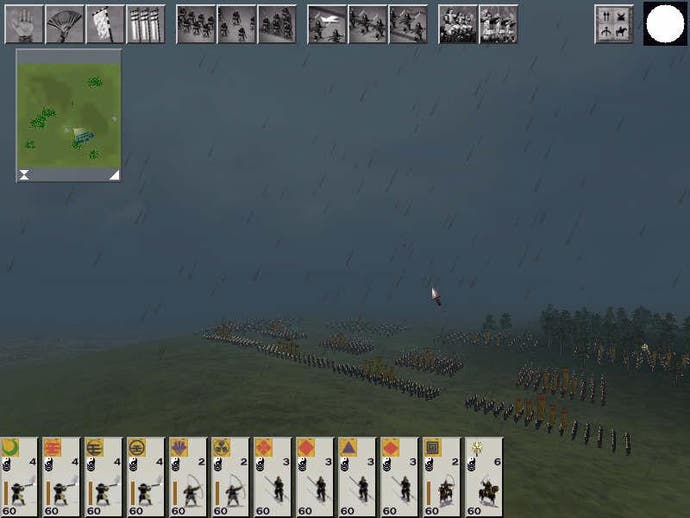
Realities Of War
It quickly becomes apparent when playing Shogun that this game is all about realism. Every element that could affect the outcome of a real-life battle has been taken into account - troops become tired if they are marching or fighting for too long, demoralised if they are losing, and some will even lay down their arms and flee if the advancing enemy seems too fearsome.
The effects of weather have been modelled accurately; you can trade with the European gaijin to acquire arquebuses, a primitive form of musket, but they will not work in anything but the lightest rain. Even the seasons of the year will affect you - if you fight during winter you must resolve the conflict more speedily, because days are shorter and your troops are ineffective at night.
All of this may have some of you thinking of the Close Combat series, but effects such as troop morale, honour and tiredness are handled in a much better fashion in Shogun, and manage to contribute to the gameplay without intruding on it.
Battles themselves are hugely difficult when compared to the rush "tactics" favoured by many RTS games. You will be forced to consider carefully the positioning of your units and the orders you give them, making use of the layout of the terrain and any natural cover nearby. Archers placed on hills can rout forces in the valleys below them as they laboriously try to climb the steep slopes. Cavalry charging against entrenched spearmen will be dismounted and annihilated by the sharp blades of the enemy naginata.
Having a superior force does not mean you will win the day, because even as commander of a vastly more powerful army than your enemy's, you will still need to weigh up various factors and issue positional orders with great care, since one slip-up can give the enemy the opening they need to rush through your lines.
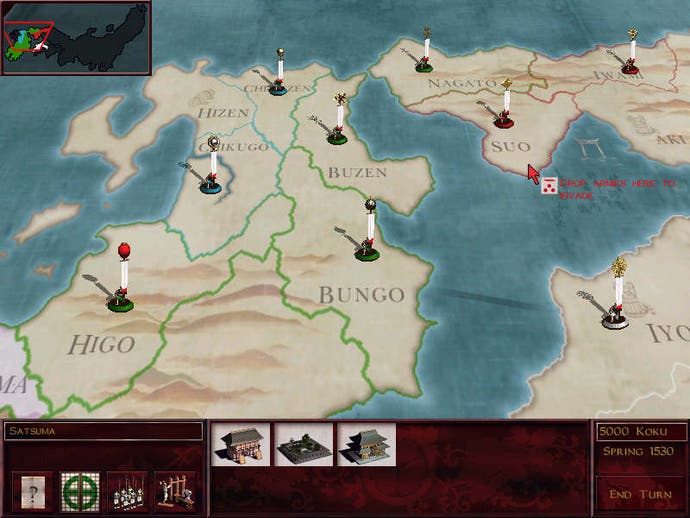
Two For One
Of course, one of the main unrealistic concepts perpetuated in conventional RTS games is the idea that battle units are manufactured or trained on the battlefield itself.
In Shogun, what you enter a battle with is all you have - you cannot create additional forces while in the battlefield. Instead there is a whole separate segment of the game devoted to the mustering of forces and the control of territory. This turn-based segment, played on a Risk-like board showing a map of Japan and her provinces, has none of the visual splendour of the battle engine, but is just as deep as regards gameplay, if not more so.
In ways reminiscent of Sid Meier's excellent Civilisation series, the turn-based game gives a whole new layer of strategy to Shogun. Starting as daimyo of your own clan, the ultimate aim of the game is to become shogun, supreme ruler of all Japan. Aside from the obvious necessity to construct castles and training grounds for your samurai, as well as moving your armies on the map in order to defend your territories or invade an enemy's, espionage and subterfuge also play a vital role in the game.
The creation of geisha and ninja, expert assassins of feudal Japan, allows you to strike against the heart of enemy clans by killing their leaders or emissaries, while the use of shinobi (spies) and emissaries enables you to stir peasant unrest in the territories of your enemies.
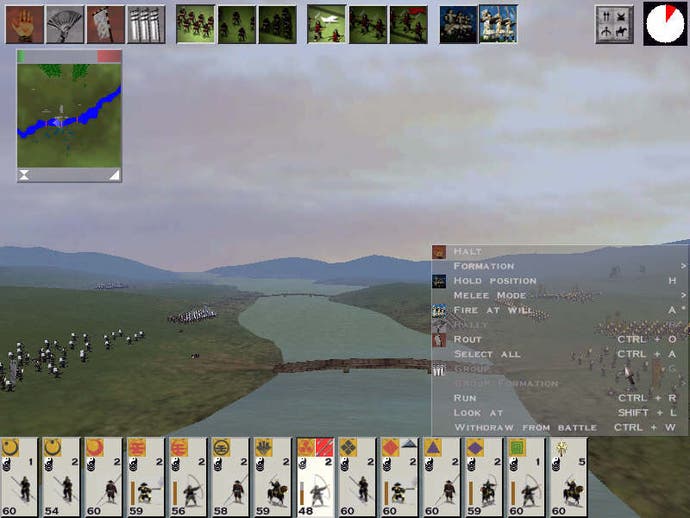
Religion
An alliance with the gaijin Portuguese and Dutch explorers will allow you to purchase arquebuses and change your religion from Buddhism to Christianity, and religion plays quite a major role in the game.
Buddhist soldiers are unhappy about being asked to do battle with units of Buddhist warrior monks, for example, while having a Christian daimyo ruling over a Buddhist province, or vice versa, will cause unrest among the people of that province. Even your relationships and alliances with the daimyo of other clans can be effected by your choice of beliefs.
All of these factors are determined on the turn-based screen, and while your skill in commanding the troops on the battlefield is vital (especially since some units, such as the Sword Dojo, cannot be built until the requisite level of experience on the battlefield is acquired), it is ultimately on the turn-based screen that the outcome of the game will be decided.
In case you are worried that you might get bored spending too long in the turn-based system, don't be. This is no mere filler between the epic battles, it is a superb and entertaining game in its own right.
Sadly, the multiplayer game options tend to ignore this entire aspect of the game, instead throwing people straight into the battle scenarios. Online play is through the EA|PLAY system, which seems quite basic but does the job.
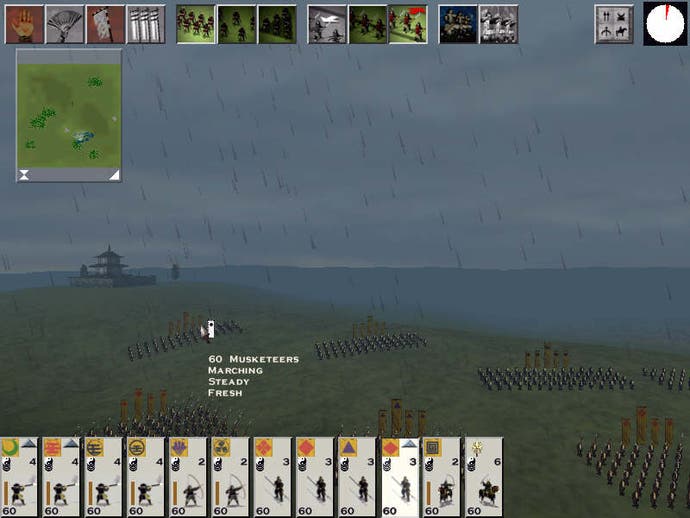
Conclusion
Shogun sets out to provide a detailed and realistic simulation of warfare in the "sengoku jidai" ("Age Of The Country At War") period of Japanese history, and it achieves this goal admirably.
Everything about the game smacks of good research and authenticity, down to the ability to select a Japanese voiceover with English subtitles rather than having English voices all the way through. Fans of samurai movies, fans of medieval warfare, or simply anyone wishing to play the single most accurate simulation of war ever created, will have no excuse for not owning a copy of Shogun : Total War.
With one caveat... This is not a game for the impatient, and it will take you several hours of play and a number of humiliating defeats before you start to have any idea of how to play properly. However, once you do get to grips with it, Shogun is a highly rewarding and engrossing game that will quite possibly be responsible for a large number of sleepless nights.



